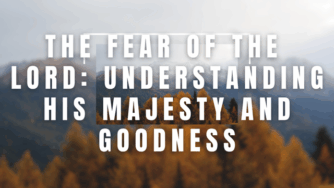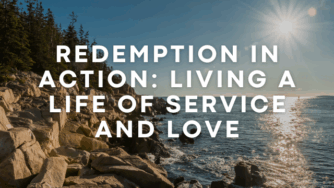Forgiveness by Emulating Christ’s Love
Forgiveness was the main them in a recent sermon at Lakeview Christian Church. Drew passionately spoke about the profound nature of true forgiveness. This isn’t a superficial, passive act where we merely brush off offenses with a casual “I’m over it.” Instead, it calls for deep, heartfelt forgiveness rooted in genuine love for one another. But how do we achieve this level of forgiveness that seems almost impossible? How do we love and forgive like Jesus did?
The key lies in adopting the right perspective. When we remember our own past—how we were guilty and in need of forgiveness before Jesus intervened—it transforms how we view the offenses of others. When we grasp the enormity of what Jesus forgave us, the wrongs done to us pale in comparison. Despite our transgressions, He loved us then, loves us now, and has already forgiven our future mistakes. This shift in perspective changes everything.
Key Number One: Perspective
The foundation of deep forgiveness is rooted in the perspective we hold. To illustrate this, let’s delve into the parable of the Unmerciful Servant found in Matthew 18:23-35 (ESV):
“23 Therefore the kingdom of heaven may be compared to a king who wished to settle accounts with his servants. 24 When he began to settle, one was brought to him who owed him ten thousand talents. 25 And since he could not pay, his master ordered him to be sold, with his wife and children and all that he had, and payment to be made. 26 So the servant fell on his knees, imploring him, ‘Have patience with me, and I will pay you everything.’ 27 And out of pity for him, the master of that servant released him and forgave him the debt.
28 But when that same servant went out, he found one of his fellow servants who owed him a hundred denarii, and seizing him, he began to choke him, saying, ‘Pay what you owe.’ 29 So his fellow servant fell down and pleaded with him, ‘Have patience with me, and I will pay you.’ 30 He refused and went and put him in prison until he should pay the debt.
31 When his fellow servants saw what had taken place, they were greatly distressed, and they went and reported to their master all that had taken place. 32 Then his master summoned him and said to him, ‘You wicked servant! I forgave you all that debt because you pleaded with me. 33 And should not you have had mercy on your fellow servant, as I had mercy on you?’ 34 And in anger his master delivered him to the jailers, until he should pay all his debt. 35 So also my heavenly Father will do to every one of you, if you do not forgive your brother from your heart.”
This parable vividly illustrates the importance of remembering the grace we’ve received. The servant, forgiven of an insurmountable debt, couldn’t extend the same mercy to his fellow servant for a much smaller debt. His failure to forgive reflected a lack of understanding and appreciation for the forgiveness he had received.
Living According to Our New Identity
Understanding our new identity in Christ is crucial in cultivating a forgiving heart. In 1 Peter 1:22-23, we are reminded of the transformative power of our new birth:
“22 Having purified your souls by your obedience to the truth for a sincere brotherly love, love one another earnestly from a pure heart, 23 since you have been born again, not of perishable seed but of imperishable, through the living and abiding word of God.”
Our new nature, given through the living word of God, empowers us to love others genuinely and deeply. This love is not merely an emotion but a commitment to place others above ourselves, a principle echoed in Philippians 2:3-4:
“Do nothing from selfish ambition or conceit, but in humility count others more significant than yourselves. Let each of you look not only to his own interests but also to the interests of others.”
This selfless perspective is another key to forgiveness. When we value others above ourselves, we are more inclined to forgive their wrongdoings, understanding that we too are flawed and in need of grace.
Love as a Witness to the World
Jesus emphasized the significance of love as a testimony to the world in John 13:34-35:
“34 A new commandment I give to you, that you love one another: just as I have loved you, you also are to love one another. 35 By this all people will know that you are my disciples, if you have love for one another.”
Our capacity to love and forgive is a powerful witness to the world. It sets us apart as followers of Christ and showcases the transformative power of His love. When we forgive deeply and sincerely, we reflect the character of Jesus and draw others to Him.
Practical Steps to Cultivating Forgiveness
- Remember Your Own Forgiveness: Reflect on the grace you have received from Jesus. Let the magnitude of His forgiveness towards you inspire a forgiving heart towards others.
- Adopt a Humble Perspective: Recognize your own imperfections and need for grace. This humility helps you extend forgiveness to others, knowing that you too are in constant need of forgiveness.
- Prioritize Relationships Over Offenses: Value the relationship more than the offense. Seek reconciliation and unity, remembering that love covers a multitude of sins (1 Peter 4:8).
- Pray for a Forgiving Heart: Ask God to help you forgive. Pray for the person who has wronged you and for the strength to let go of any bitterness or resentment.
- Practice Empathy: Try to understand the perspective of the one who wronged you. Empathy can soften your heart and make forgiveness easier.
The Transformative Power of Forgiveness
The act of forgiving others goes beyond merely restoring relationships; it transforms our own hearts. When we forgive, we free ourselves from the chains of bitterness and resentment, allowing God’s love to flow through us more freely. This transformation is evident in our daily interactions, as we become more patient, understanding, and compassionate.
Forgiveness also has a profound impact on our mental and emotional well-being. Holding onto grudges can lead to stress, anxiety, and a host of other negative emotions. By choosing to forgive, we release these burdens and experience a sense of peace and joy that comes from living in alignment with God’s will.
Forgiveness as an Act of Worship
Forgiving others is not just a duty; it is an act of worship. When we forgive, we mirror God’s nature and bring glory to Him. Ephesians 4:32 reminds us of this:
“Be kind to one another, tenderhearted, forgiving one another, as God in Christ forgave you.”
By emulating God’s forgiveness, we demonstrate our gratitude for His mercy and grace. It is an acknowledgment of His sovereignty and an expression of our desire to follow His example.
The Role of Community in Forgiveness
Forgiveness is often nurtured within the context of community. Being part of a supportive and loving church family can provide the encouragement and accountability needed to practice forgiveness. In a healthy community, members can share their struggles, pray for one another, and offer wisdom and support.
James 5:16 highlights the importance of community in the healing process:
“Therefore, confess your sins to one another and pray for one another, that you may be healed. The prayer of a righteous person has great power as it is working.”
When we confess our hurts and seek prayer, we open ourselves up to God’s healing power. The act of sharing our burdens with trusted friends can lighten our load and provide the strength needed to forgive.
Real-Life Stories of Forgiveness
Stories of forgiveness can inspire and challenge us to extend the same grace to others. Consider the story of Corrie ten Boom, a Holocaust survivor who forgave the Nazi guard responsible for the death of her sister. Her willingness to forgive such a grave offense is a powerful testimony to the transformative power of God’s love.
Another example is found in the life of Nelson Mandela, who, after spending 27 years in prison, forgave his captors and worked towards reconciliation in South Africa. His commitment to forgiveness and peace helped heal a nation divided by apartheid.
These stories remind us that forgiveness is possible, even in the most challenging circumstances. They encourage us to rely on God’s strength and grace to forgive those who have wronged us.
The Journey of Forgiveness
Forgiveness is not a one-time event but a journey. It often requires time, prayer, and a continual reliance on God’s grace. There may be moments when old wounds resurface, and the pain feels fresh again. During these times, it is essential to reaffirm our commitment to forgive and seek God’s help in doing so.
The journey of forgiveness also involves setting healthy boundaries. Forgiving someone does not mean allowing them to continue hurting us. It is possible to forgive and still maintain boundaries that protect our well-being.
Practical Exercises for Forgiveness
Here are some practical exercises to help cultivate a forgiving heart:
- Journaling: Write about your feelings towards the person who wronged you. Express your hurt and anger, and then write a letter of forgiveness (even if you never send it). This exercise can help release negative emotions and bring clarity to your thoughts.
- Meditation: Spend time meditating on scriptures about forgiveness. Verses like Colossians 3:13 and Matthew 6:14-15 can provide comfort and encouragement.
- Acts of Kindness: Perform acts of kindness towards the person who wronged you. Doing something positive for them can soften your heart and foster a spirit of forgiveness.
- Seek Counseling: If the hurt is deep and forgiveness feels impossible, consider seeking counseling. A professional can provide guidance and support as you work through your emotions.
The Role of the Holy Spirit
The Holy Spirit plays a vital role in the process of forgiveness. He empowers us to do what we cannot do on our own. When we feel weak and incapable of forgiving, we can ask the Holy Spirit to fill us with God’s love and strength.
Romans 5:5 reminds us of this truth:
“And hope does not put us to shame, because God’s love has been poured into our hearts through the Holy Spirit who has been given to us.”
With the Holy Spirit’s help, we can overcome the barriers to forgiveness and extend grace to those who have hurt us.
Conclusion
Deep forgiveness is not a passive or superficial act; it is a profound demonstration of Christ’s love in us. By shifting our perspective to remember the forgiveness we’ve received, living according to our new identity, and prioritizing love as a witness to the world, we can cultivate a forgiving heart.
As Drew’s sermon reminds us, this journey begins with understanding the magnitude of Christ’s forgiveness towards us. When we grasp this truth, we are empowered to forgive others deeply and sincerely, reflecting the heart of Jesus to a watching world.
Forgiveness is a journey that requires daily commitment and dependence on the Holy Spirit. Let us strive to embody this deep forgiveness, loving one another earnestly from a pure heart, and shining as true disciples of Christ. Through our forgiveness, we not only experience personal transformation but also become a powerful testimony of God’s love and grace to those around us.
Through the power of the Holy Spirit, the global church can forgive and deeply love one another. This divine empowerment enables us to transcend our human limitations and extend forgiveness that mirrors the boundless grace of God. When the church collectively embraces this call to forgiveness and love, it becomes a beacon of light in a world often overshadowed by bitterness and division.
When this happens, the world will know the glory of God. As Jesus said in John 13:35, “By this all people will know that you are my disciples, if you have love for one another.” This profound love and forgiveness will reveal God’s glory to the world, showcasing the transformative power of His grace.
The unity and love within the church serve as a living testimony of God’s work in our lives. When we forgive one another deeply, it reflects the radical forgiveness we have received from Christ. This testimony is not just for our benefit but for the world to see. It becomes a tangible demonstration of the Gospel, drawing others to the love and redemption found in Jesus.
In a world that is desperate for reconciliation and peace, the church’s example of forgiveness can act as a powerful catalyst for change. It can break down barriers, heal wounds, and foster a sense of community that transcends cultural, racial, and societal divisions. By living out the call to forgive and love one another deeply, the church embodies the hope and healing that are found in Christ alone.
Let us, therefore, rely on the Holy Spirit to empower us to forgive as Christ forgave us. May our lives be marked by a love that is patient, kind, and enduring. And through this love, may the world see the glory of God revealed in and through us, compelling them to seek the same transformative grace that we have found in Jesus Christ.





